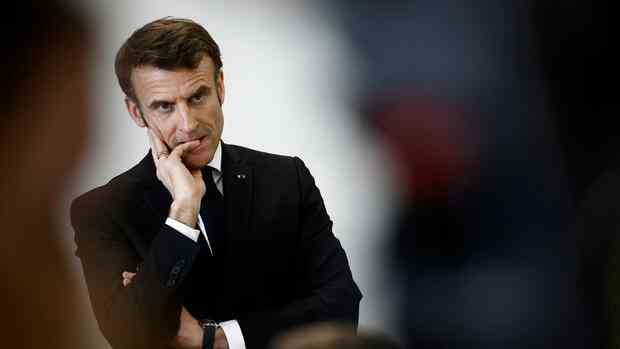Macron sees the events in Mali and the French troops’ loss of power there as a cautionary tale.
(Photo: AP)
Paris Emmanuel Macron chose one word for his new approach to Africa policy: modesty. France wants to build a “balanced and responsible” partnership with the former colonies, the President promised ahead of a trip that will take him to Gabon, Angola, Congo and the Democratic Republic of Congo this week. He announced that French troop strength on the continent would be “visibly” reduced later this year.
Macron’s newfound modesty reflects France’s waning influence in Africa. The French army has had to leave Mali, Central Africa and Burkina Faso in the past twelve months. “The failed counter-terrorism operation in the Sahel has undermined the legitimacy of the French military presence across Africa,” said Thierry Vircoulon, Africa expert at the Paris think tank Institut français des relations Internationales (Ifri).
The political damage is great, the reputation of the French tarnished – and at a hardly worse time. Now the French commitment is being reduced at a time “when strategic competition in Africa is intensifying,” Vircoulon told the Handelsblatt. In the end, one man in particular could benefit from this: Russian President Vladimir Putin.
China’s ambitions are high: Beijing has secured lucrative access to raw materials and political influence over African governments with cheap loans and investments in major projects. But Russia has recently been increasingly aggressive, especially in French-speaking Africa.
The French government blames disinformation and propaganda by Russian secret services for turning public sentiment against the military operation in Mali, which began in 2013. Macron admits that Operation Barkhane, which was directed against terrorist groups and Islamist rebels, did not bring the promised stability to the crisis region. But France was the “ideal scapegoat” for this, said the President.
Wagner mercenaries instead of French soldiers
Instead of French units, mercenaries from the Russian Wagner Group are now patrolling Mali and neighboring countries. The “strategic priority of the Europeans” is of course the Russian war of aggression against Ukraine, says Ifri expert Vircoulon. However, Moscow’s influence in the Sahel also harbors security policy risks: Putin has no interest in protecting the European Union from terrorist threats or curbing migration.
>> Read here: How Russia uses disinformation in the Ukraine war
Before his trip to Russia, Macron said he did not want to engage in “anachronistic” power games in Africa. But Mali is a warning example of what could happen if Russian secret services stir up anti-French sentiment in the region. “If we’re not careful, this trap can snap again somewhere else,” the president said.
Dual management of bases planned
For this reason, Macron wants to manage the French bases, which are reminiscent of the colonial past, together with the African host countries. Facilities in Senegal, Ivory Coast, Gabon and Chad are affected. The exception, however, is the largest foreign base in Djibouti on the Horn of Africa, which France will continue to operate alone as an important hub to the Pacific.
France still has around 6,000 soldiers stationed in Africa.
(Photo: AP)
The President held back on details. He neither explained how the dual administration of the bases should be precisely regulated, nor did he give any information about how many of the approximately 6,000 French soldiers in Africa should be withdrawn.
>> Read here: South Africa invites Russia and China to naval maneuvers – Moscow hopes for more influence at the Cape
The first leg of Macron’s trip to Gabon focuses on environmental issues, with the President taking part in a meeting to protect the rainforests, among other things. In Angola, the main focus is on cooperation in the agricultural sector, while in Congo Macron is dedicated to cultural cooperation. An African-European business forum is taking place in the Democratic Republic of the Congo, and EU Industry Commissioner Thierry Breton is also attending.
In the political talks on his trip, Macron will also address the attitude of his hosts to the Russian war of aggression against Ukraine, says Ifri expert Vircoulon. “It’s about increasing the pressure that these countries don’t remain neutral.”
Gabon, Angola and Congo abstained in the recent United Nations General Assembly vote on a resolution on Russia’s withdrawal. Of the 32 abstentions, 15 came from African countries. Two African states even voted against withdrawal alongside Russia: Eritrea and Mali.
More: Anniversary of the Russian Invasion – analysis, reports, commentary and podcasts
